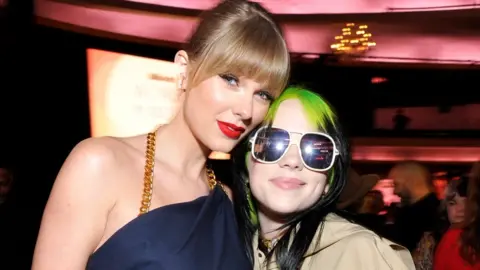Billie Eilish and Taylor Swift boost music industry revenues to $20bn
 Getty Images
Getty ImagesThe recorded music industry made $20bn (£16.1bn) last year, the first time the figure has been reached since 2005.
Streaming sites like Spotify and Apple Music drove the success, accounting for more than half (56.1%) of all revenues - a total of $11.4bn (£9.2bn).
Billie Eilish had the top-selling single, with her goth-pop smash Bad Guy, while Japanese band Arashi had the year's most successful album.
Their 20th anniversary greatest hits album sold 3.3m copies worldwide.
It narrowly beat Taylor Swift's latest record, Lover, which sold 3.2m copies to take second place.
When singles and albums were combined, Swift was the year's biggest-selling artist for the second time in her career (the first being in 2014).
Overall, music industry revenue was up by 8.2% in 2019, marking the fifth consecutive year of growth, said the IFPI, which represents the industry.
The UK was particularly healthy, registering growth of 7.2% - making it the biggest music market in Europe, and the third-biggest in the world, after the US and Japan.


However, the number of people taking up new subscriptions to streaming services continued to level off, which may cause concern for the future.
There were 341 million paying users of streaming services at the end of 2019, a rise of 33.5%. In 2018 the figure was 44.9%; and a year earlier it was 57.1%.
It is unknown how the Covid-19 pandemic will affect these figures. According to the latest study by Billboard and Nielsen Music, audio streaming is down by 6% during the lockdown, but the number of people playing music videos has risen by 13%.
The same survey found that 24% of Americans had added a new subscription service during the lockdown - although video services like Netflix and Amazon Prime are seeing more benefit than music sites.
The IFPI's figures do not include live music revenue - which is the sector of the industry most affected by the lockdown.
However royalties collected from music played in pubs, clubs and concert venues are counted, and could see a significant fall this year.
The IFPI's CEO acknowledged that the coronavirus outbreak presented "challenges unimaginable just months ago".
"In the face of a global tragedy, the music community has united behind efforts to support those affected," said Frances Moore.
"This is a critical and ongoing priority as our member record companies work to continue to support the careers of artists, musicians and employees around the world."

Follow us on Facebook, or on Twitter @BBCNewsEnts. If you have a story suggestion email [email protected].
